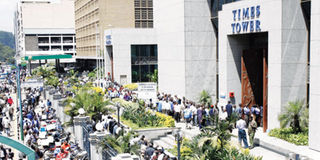KRA under pressure to meet Sh1 tr tax target

PHOTO | FILE Taxpayers line up outside the Kenya Revenue Authority offices to file their tax returns in the past. The government has increased pressure on the taxman to seal revenue leakages and meet collection targets.
What you need to know:
- According to the Budget Review and Outlook Paper tabled in Parliament last week, the Treasury wants the taxman to institute corrective measures to reverse revenue losses in Value Added Tax
- Last month, the Treasury shelved plans to reintroduce the new VAT Bill until after the March 4 General Election
- In the last financial year, KRA collected Sh707.4, missing the target by Sh10 billion
The government has increased pressure on the taxman to seal revenue leakages and meet collection targets.
According to the Budget Review and Outlook Paper tabled in Parliament last week, the Treasury wants the taxman to institute corrective measures to reverse revenue losses in Value Added Tax.
It has proposed that the Kenya Revenue Authority (KRA), among other things, reintroduce the withholding tax mechanism and increase compliance in taxing remittances to shore up its revenues.
The government has set a Sh1 trillion revenue target for the KRA to help fund a ballooning public expenditure bill and also finance the devolved system of governance as set out in the new Constitution.
According to the Outlook paper, the other options KRA has in reversing revenue losses include the reintroduction of previous withholding mechanism, enhancing compliance audit of large VAT payers and speeding up the implementation of collection of other sources of taxes like rental income.
“The proposed VAT law is expected to address the challenges relating to VAT withholding and refund system and make the VAT law more efficient and easy to comply with by taxpayers. This is expected to enhance revenue yield from this tax,” the Budget Review and Outlook Paper reads in part.
However, KRA spokesman Kennedy Onyonyi told the Sunday Nation that the revenue collector is still waiting for formal communication on reintroducing tax withholding.
Previously, the KRA appointed withholding agents, including government ministries, state corporations, local authorities among others, who would withhold VAT while paying their suppliers and remit the same to the taxman.
“This system generated accelerated refund claims that were not possible to settle. It is against this backdrop that KRA strongly felt the system was not sustainable and required overhaul,” Mr Onyonyi said in the interview.
But analysts point out that some taxpayers were failing to remit the withholding tax to the revenue collector in the current mechanism, prompting the government to push for reintroduction the previous mechanism.
Whereas tax experts argue this is a good move that would see the KRA collect more revenue, they say the problem of tax refunds is likely to persist given that the tax collector would now have more money to refund.
“The government would collect more money, but this also means that it would have to pay back more of the money in refunds,” PricewaterhouseCoopers director Rajesh Shah said, adding that this may present a problem given the challenges arising from tax refunds.
Due to the economic challenges experienced in the first half of the 2011/12 fiscal year and changes in VAT withholding mechanism, tax collection fell short of the target by Sh34.2 billion.
The government also absorbed duty elimination on kerosene, wheat and maize, leading to an annual revenue loss of about Sh12 billion.
According to the quarterly Economic and Budgetary Review from the Ministry of Finance, KRA missed the revenue collection target by Sh45.3 billion.
The authority managed to collect Sh165.7 billion, 21 per cent below a target of Sh211 billion in first quarter (June-September) this financial year.
The missed target resulted from underperformance in VAT, where revenue collected was 24 per cent lower than expected. The government had projected to collect Sh54.6 billion in VAT but only managed to raise Sh41.5 billion.
The revenue collection performance further led to a rise in the overall cumulative fiscal shortfall to Sh71.6 billion from a target of Sh58.7 billion.
Last month, the Treasury shelved plans to reintroduce the new VAT Bill until after the March 4 General Election.
The VAT Bill 2012 would have slapped a 16 per cent levy on fertiliser, maize flour, bread, wheat flour, milk and books to increase revenues for rising expenditure needs, a move that could have pushed up the prices of such commodities.
In the last financial year, KRA collected Sh707.4, missing the target by Sh10 billion.




